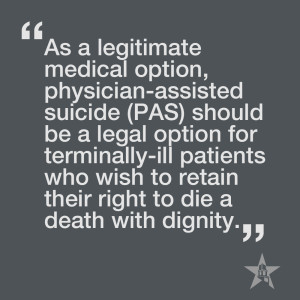During Easter break, I spent a day holed up in my room at home indulging in one of my favorite pastimes: watching documentaries. This time around I stumbled on the lesser known film How to Die in Oregon on Netflix. As the title suggests, the documentary takes place in Oregon which, in 1994, legalized physician-assisted suicide with the Death with Dignity Act. The film’s website defines the process in this way: “any individual whom two physicians diagnose as having less than six months to live can lawfully request a fatal dose of barbiturate to end his or her life.” While a fantastic film in its own right, I was impressed with the way this film tackled the intense debate over physician-assisted suicide in a responsible and respectful manner.
 Often referred to as either “physician-assisted suicide” or “physician-sanctioned end-of-life option,” the decision that the Death with Dignity Act places in the hands of terminally-ill patients is their own right to die, and to die with dignity. This is a distinctly modern dilemma, one created by the exponential growth of medical technology that has extended the human lifespan considerably. While this progress is undeniably welcome and beneficial, it nonetheless leaves an increasing number of individuals with a life that is artificially prolonged far beyond a point they believe necessary or desirable. In a way, current medical progress has become harmful. It has gotten to the point that people can no longer die a natural death on their own terms.
Often referred to as either “physician-assisted suicide” or “physician-sanctioned end-of-life option,” the decision that the Death with Dignity Act places in the hands of terminally-ill patients is their own right to die, and to die with dignity. This is a distinctly modern dilemma, one created by the exponential growth of medical technology that has extended the human lifespan considerably. While this progress is undeniably welcome and beneficial, it nonetheless leaves an increasing number of individuals with a life that is artificially prolonged far beyond a point they believe necessary or desirable. In a way, current medical progress has become harmful. It has gotten to the point that people can no longer die a natural death on their own terms.
As a legitimate medical option, physician-assisted suicide (PAS) should be a legal option for terminally-ill patients who wish to retain their right to die a death with dignity. The debate surrounding PAS is fierce and is not without its merit on both sides. While I align myself with those arguing for PAS to be an available and legal medical option, I acknowledge that those who oppose this argument have a case.
In brief, the “pros” of PAS include the following: a person has the right to die with dignity and in a humane way; as patients, they have a right to their preferred treatment option; PAS takes into account a person’s wish to not burden their family with additional medical costs and suffering. In my opinion, the strongest arguments for PAS are those centered on the patient’s right to die. If a terminally ill patient is judged to be competent and psychologically stable and they request the aid of a physician in dying, why should they be denied? Our medical system has several protocols already in place that address this right, including the DNR (do not resuscitate) order and designation of a medical proxy by the patient. Physicians are legally bound to follow these protocols, even if the patient’s family desires otherwise. The decision, as I think it should, belongs solely to the patient. Which is why I argue that PAS should be legal and respected in the same way that a DNR order is.
 The “cons” of the debate include the following: there is the option for terminally ill patients to receive palliative care; some argue that for physicians it is a violation of the Hippocratic Oath (e.g. “do no harm”); possibility for doctors to make an inaccurate prognosis; and it is hotly contested in terms of whether or not it is moral or ethical practice. While I acknowledge the moral and ethical dilemmas PAS may pose for physicians, it is not a convincing counter argument.
The “cons” of the debate include the following: there is the option for terminally ill patients to receive palliative care; some argue that for physicians it is a violation of the Hippocratic Oath (e.g. “do no harm”); possibility for doctors to make an inaccurate prognosis; and it is hotly contested in terms of whether or not it is moral or ethical practice. While I acknowledge the moral and ethical dilemmas PAS may pose for physicians, it is not a convincing counter argument.
I’m for physician-assisted suicide for the same reasons I’m pro-choice. A physician’s job in either case is to look out for and care for the patient’s physical and psychological well-being. Physicians are responsible for informing patients of the procedures and the risks they carry physically and psychologically. They are responsible for answering to the best of their ability questions their patients pose regarding the medical decision they are weighing. And should it be necessary, they are responsible for following-up with patients and/or their designated medical proxy. At this point their responsibility stops, both legally and professionally. Physicians are neither required nor should they feel compelled to provide their personal moral or religious opinion to their patients. Additionally, they cannot take the burden of the patient’s decision on themselves. The decision and responsibility belong to the patient alone.
I support the Death with Dignity Act. I support the right for patients to request and receive medical assistance in making the decision to die with dignity. I support the right of physicians to help and enable their patients to make this decision legally. At the end of the day, the controversy surrounding PAS is warranted, however I firmly believe that the rights of the patient as a person must be respected above all else.

2 replies on “The Right to Die (With Dignity)”
[…] “The Right to Die (With Dignity),” The Houghton Star, 4/14/2016 […]
I agree that “the rights of the patient as a person must be respected above all else.” I take exception to the polling on legalizing assisted suicide.
I have found (serving 60 fair booth days) that about half of the public thinks they are in favor of such a law, that is until they learn about the flaws in the laws that create new paths of elder abuse with immunity. Once they learn that a predatory heir may steer the signup process and then forcibly administer the lethal dose without oversight, they all said, “I am not for that!”.
Anyway all of these Oregon Model bills have the same flaws that work together to eviscerate flaunted safe guards.
For example how many times have you nodded your head when the proponents declared that the lethal dose must be self-administered?
Well, read the language of the law/bill and you will find that there is no means provided to insure that marketing point. For example “self-administrate” was mentioned 11 times in the 8 page Minnesota SF 1880 and yet there was no means provided to confirm that the lethal dose was forced on not, who would know if they struggled and not consented.
In fact what is provided is that there may be no investigations allowed after the death (page 6 of 8 Subd. 12. In addition allowing a stranger that claims to know how the person communicates may speak for them eviscerates all the intended safeguards, page 1 of 8 (e).
Along with allowing predatory heirs and staff to witness even as other family members are not required to be contact.
This is a very dangerous public policy that by their own records in OR and WA is establishing poisoning as the “medical standard of care” for people that have “feelings” of fear of the loss of autonomy.
We are all at risk of abuse by these poorly composed laws/bills.
Thank you for your public service,
Bradley Williams
President
MTaas dot org